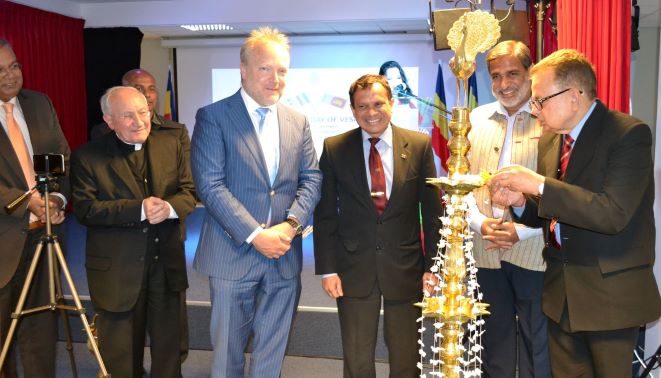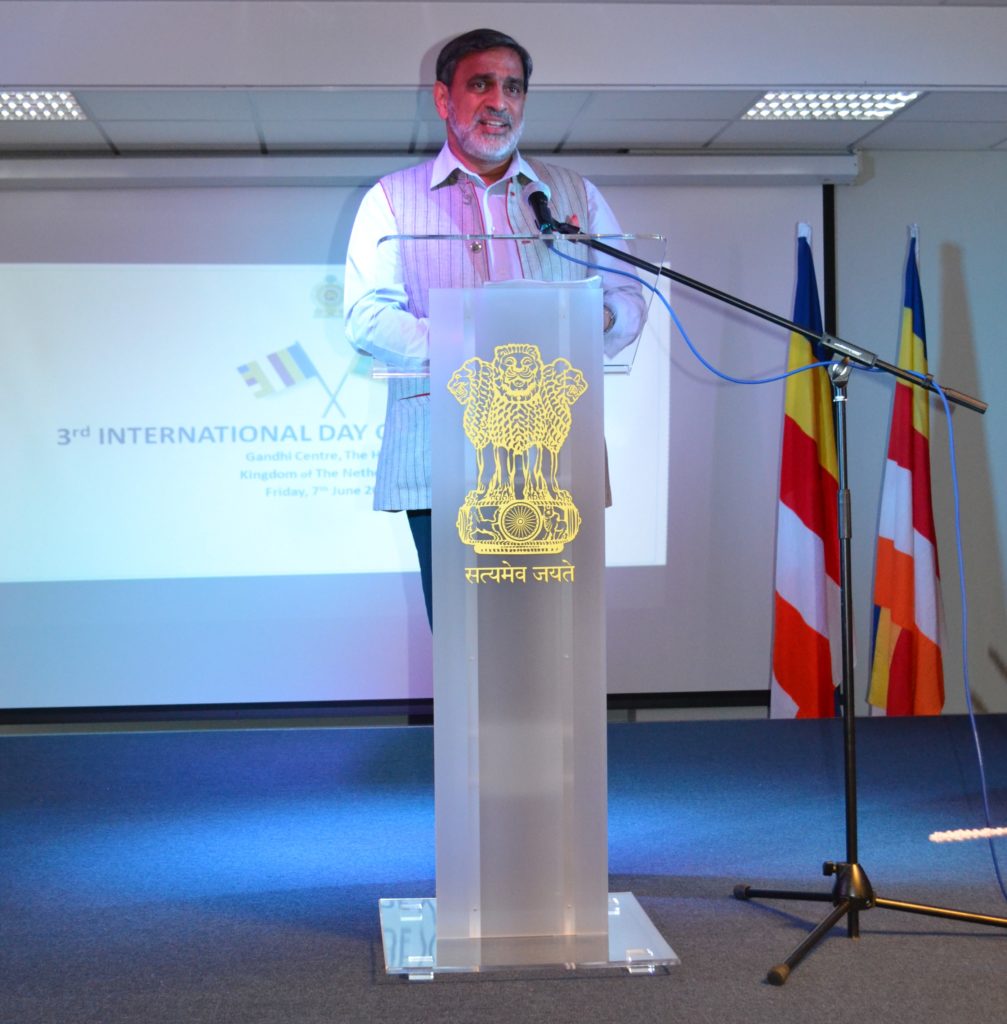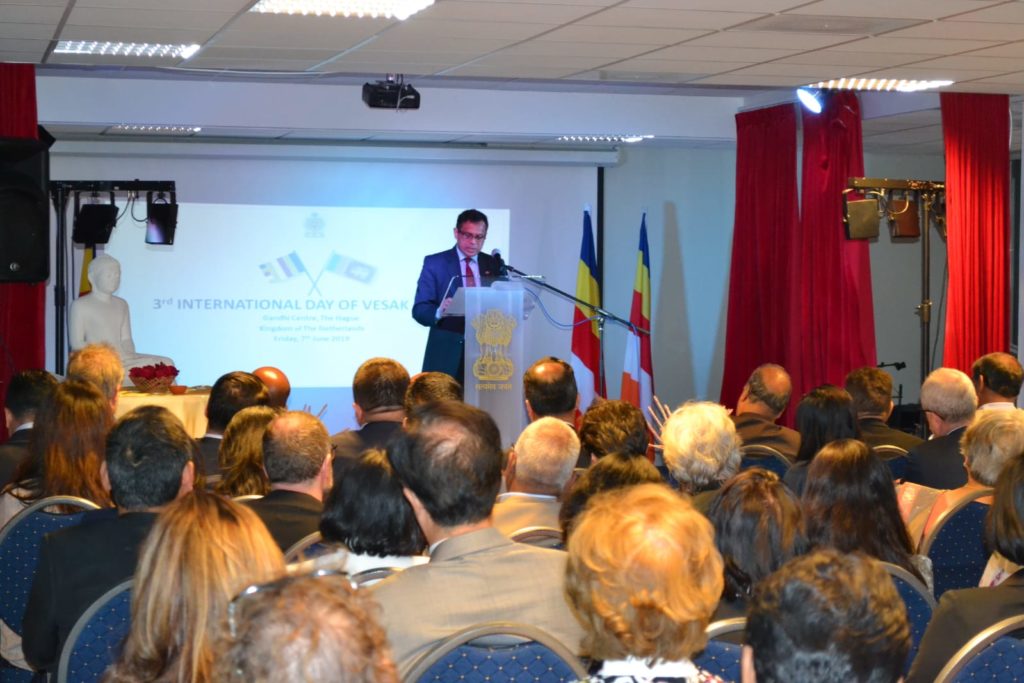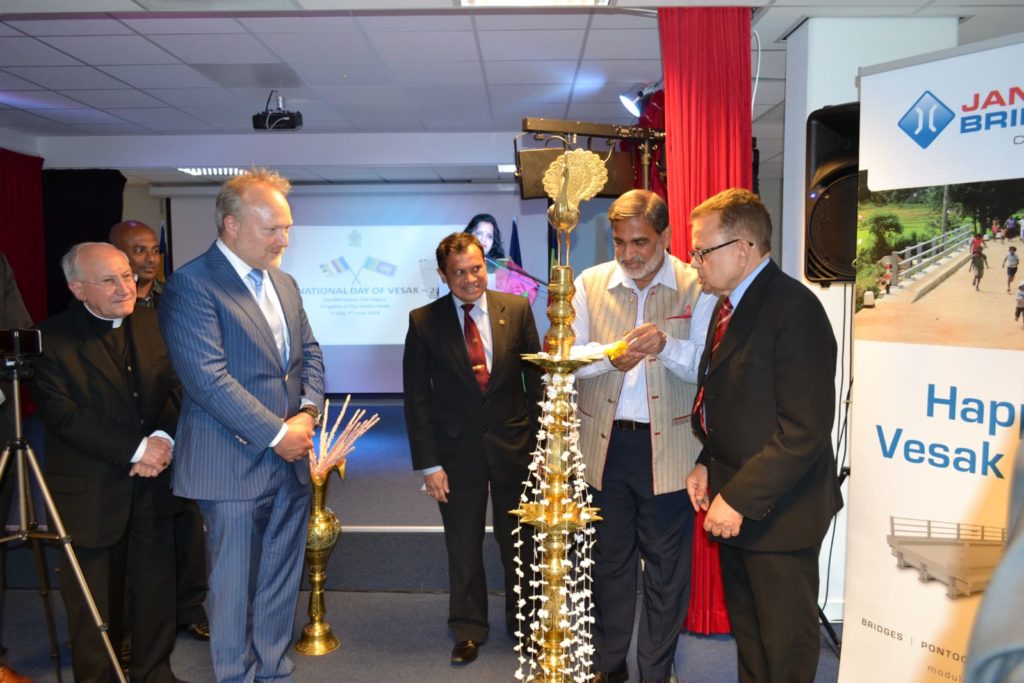
The International Day of Vesak was observed at an impressive, yet simple ceremony at the Gandhi Centre, which was filled to capacity in The Hague on Friday, 07 June 2019, organized by the Sri Lanka Embassy in The Hague for the third consecutive year.The programme commenced with the lighting of the traditional oil lamp by the Guest of Honour H.E. Dalweer Bhandari, Judge of the International Court of Justice, who was joined by Ambassador Venu Rajamony of India and Ambassador A.M.J. Sadiq of Sri Lanka, the Apostolic Nuncio, Monsignor Aldo Cavalli, Mr. Sander Janssen representing the Dutch Foreign Ministry, Mr. Rabin Baldewsingh, former Deputy Mayor of The Hague, and Mr. Amal Fernando, representing the Sri Lankan Buddhist community in The Netherlands.
In his opening remarks on behalf of the International Court of Justice (ICJ), Judge Bhandari who presided over the event, spoke on the significance and the contribution of Buddhist philosophy to international law and consequently its important role in building peace and security. He also alluded to the UN General Assembly Resolution on the ‘International recognition of the Day of Vesak at United Nations Headquarters and other United Nations offices” adopted in December 1999, which gave rise to the observance of the Vesak Day at the UN. However, it was only in 2017, that the International Day of Vesak was observed in The Hague, the seat of the ICJ, the only principal organ of the UN, located outside New York. Judge Bhandari’s address was followed by the screening of a short documentary movie, titled “The Story of the Buddha”.
The highlight of the evening’s proceedings was the guest lecture delivered by the Ambassador of India to The Netherlands, Shri Venu Rajamony. In his thought provoking address, Ambassador Rajamony recalled that Vesak is a sacred day for the peoples of India and Sri Lanka and Buddhists all over the world who had received the invaluable gift of the teachings of the Buddha. He also underscored the strong historical and civilizational links between India and Sri Lanka through the advent of Buddhism in Sri Lanka in the 3rd century BC. He pointed out that the great Indian Emperor Ashoka sent his own son Arahat Mahinda and daughter, Princess Sanghamitta to carry the message of the Buddha to Sri Lanka.
Referring to the Sri Maha Bodhi tree in Anuradhapura, which was brought by Princess Sanghamitta as a sapling from the sacred Bodhi Tree in Bodhgaya, under which the Buddha attained enlightenment, Ambassador Rajamony said that this tree is preserved and venerated in Sri Lanka, and serves as a symbol of the deep-rooted relations between India and Sri Lanka. The bonds forged since then have only grown stronger over the years with the shared commitment of both the nations in spreading peace across the globe.
The Ambassador of Sri Lanka, A.M.J. Sadiq who delivered the Vote of Thanks stated that it was in the fitness of things that the International Day of Vesak observance in The Netherlands coincided with the 150th birth anniversary of the great exponent and apostle of Ahimsa (non-violence), Mahatma Gandhi. It was also doubly significant that the event was being held at the Gandhi Centre which had been made available by the good offices of the Indian Ambassador. Ambassador Sadiq paid his respectful appreciation to Ven. Kurunegala Anandagosha Thero, Chief Incumbent of the Mahamevnawa Buddhist Monastery in The Netherlands for his presence and the donation of a book on Buddhism to all the invited guests. He also read a short excerpt of the Message to Buddhist Friends, on the occasion of Vesak-2019 issued by the Pontifical Council for interreligious Dialogue of the Holy See on the theme, “Promoting the Dignity and Equal Rights of Women and Girls” that the Apostolic Nuncio, His Excellency Monsignor Aldo Cavalli had sent.
Ambassador Sadiq conveyed his sincere thanks to Mr. Robert Barkel, CEO of Janson Bridging, a Dutch company, which is engaged in constructing bridges in Sri Lanka for the sponsorship extended to hosting the International Day of Vesak since its inception at the Peace Palace in The Hague in 2017.
The event was attended by around 100 invited participants, including many Ambassadors, heads and representatives of international organizations, members of the diplomatic corps, academics and members of the civil society, and concluded with a reception.
Embassy of Sri Lanka
The Hague, The Netherlands
14 June 2019
---------------------------------------------------
Guest Lecture delivered by the Ambassador of India, H.E. Shri Venu Rajamony on the occasion of the 3rd International Vesak Day at the Gandhi Centre in The Hague on 07 June 2019
Excellencies,
Ladies & Gentlemen,
Friends
It is my privilege and honour to be hereonthe International Vesak Day and I am grateful to His Excellency A.M.J. Sadiq, the Ambassador of Sri Lanka for extending me the honour to speak on this auspicious occasion. It was on the Day of Vesak two and a half millennia ago (2563 years), in the year 623 B.C., that the Buddha was born. It was also on the Day of Vesak that the Buddha attained enlightenment, and it was on the Day of Vesak that the Buddha in his eightieth year passed away.It is a day to reflect on the teachings of Lord Buddha of the ultimate truth and timeless relevance of Dhamma, and the four noble truths of Dukkha (truth of suffering), Samudaya (truth of the cause of suffering), Nirodha (truth of the end of suffering) and Magga (truth of the path) .
Vesak is a sacred day for the people of Sri Lanka, the people of India and Buddhists all over the world and our region is proud to have given the world the invaluable gift of the teachings of Buddha. India has shared great cultural and civilizational ties with its neighbours in Asia. The message of Lord Buddha spread beyond India’s borders, particularly eastwards, through Sri Lanka to Myanmar, Thailand, Cambodia and Laos.
The advent of Buddhism in Sri Lanka in the 3rd century BCE is linked with the arrival in Sri Lanka of Prince Mahendra (also known as Arahat Mahinda) and later of Princess Sanghamitra, the children of the great Indian Emperor Ashoka who brought with them the eternal message of Lord Buddha –the Dhamma, as well as a sapling of the sacred Bodhi tree from Bodh Gaya. Till date, the Bodhi tree is preserved and venerated in Sri Lanka and it is in fact a symbol of the deep rooted relations between India & Sri Lanka. The bonds forged then have only grown stronger over the years with the shared commitment of both the nations in spreading peace across the globe.
The foremost champion of Buddhism in ancient India was our great emperor, Ashoka. Ashoka was a blood thirsty ruler who waged fierce war after war and conquered territory after territory. In 260 BC, he fought and won a bitter war in Kalinga in the east of India. Visiting the battlefield after the war, the Emperor saw the horrors he had wreaked. 100,000 had died and 150,000 had to be deported. The disastrous consequences of the war he had waged created an internal transformation in him leading him to declare that henceforth he shall wage no more war. He will adopt the path of Buddhism and only pursue peace and non-violence.
The Buddha’s teachings have had a major influence on the founding of our nation, our Constitution and our vision of the world.This year we celebrate the 150th birth anniversary of the Mahatma Gandhi.He always acknowledged a debt of gratitude to Lord Buddha.During a Buddha Jayanti meeting in 1924 Gandhi said that the Buddha was the greatest teacher of Ahimsa (non-violence) and that he “taught us to defy appearances and trust in the final triumph of Truth and Love.”
The tradition of persuasion by truth and non-violence, for which India is justly famous for and inspired our freedom struggle finds its roots in the teachings of Buddha.
Excellencies, Ladies and Gentlemen,
The national emblem of India today is the Lion Pillar taken from a stupa erected by this great Emperor Ashoka. It has four lions looking in four directions as well as a wheel with 24 spokes representing the Dharma Chakra of Buddhism. The same Ashoka Chakra is also represented in the heart of our national flag . By adopting this Lion Pillar as the national symbol and reflecting the wheel in the flag, the Republic of India recognizes its allegiance to the philosophy of the Buddha, attests the positive change Emperor Ashoka brought to his rule and reaffirms its commitment towards upholding peace,promoting all forms of tolerance and the principle of non-violence.
Excellencies, Friends
Interestingly, the Chairman of the Drafting Committee of the Indian Constitution, a great patriot and scholar, Dr. B R Ambedkar was also a Buddhist by choice. He believed that the emergence of Buddhism in India was a development as significant in human history as the French Revolution.
Dr. Ambedkar said, and I quote “The teachings of Buddha are eternal, but even then Buddha did not proclaim them to be infallible. The religion of Buddha has the capacity to change according to times, a quality which no other religion can claim to have...Now what is the basis of Buddhism? If you study carefully, you will see that Buddhism is based on reason. There is an element of flexibility inherent in it, which is not found in any other religion.” Unquote
The journey from Siddhartha to becoming Gautam Buddha is not just a story of achieving Nirvana. This is the story of the truth that anyone who tries to alleviate pain and suffering of others with his knowledge and wealth walks on the path of becoming Buddha from Siddhartha. He can walk on the path to achieve wisdom.
The story of Angulimala is relevant in this day and age because it teaches us the redemptive power of the Buddha's teaching. He grows up as an intelligent young man in Sāvatthī, and during his studies becomes the favorite student of his teacher. However, out of jealousy, fellow students set him up against his teacher. In an attempt to get rid of Aṅgūlimāla, the teacher sends him on a deadly mission to find a thousand human fingers to complete his studies. Trying to accomplish this mission, Aṅgulimāla becomes a cruel brigand, killing many and causing entire villages to emigrate. Eventually, this causes the king to send an army to catch the killer. Meanwhile, Aṅgulimāla's mother attempts to interfere, almost causing her to be killed by her son, as well. The Buddha manages to prevent this, however, and uses his power and teachings to bring Aṅgulimāla to the right path. Aṅgulimāla becomes a follower of the Buddha, and to the surprise of the king and others, becomes a monk under his guidance. The story serves as an example that even the worst of people can overcome their faults and return to the right path, and a timely reminder for that by following the principles and precepts of Buddhism, the root causes of many of the man-made conflicts in the present day can be resoved peacefully.
Thank you.
-----------------------------------------------------
Vote of Thanks on the occasion of the 3rd International Day of Vesak at the Gandhi Centre, The Hague Friday, 07 June 2019
The most delightful aspect of the job of an event organiser is to thank and express gratitude to all those who helped in its organisation.
I feel privileged to perform this pleasant task today, on the auspicious occasion of the International Day of Vesak at the Gandhi Centre in The Hague behalf of the Embassy of Sri Lanka. This is the third time that the International Day of Vesak is being observed in The Netherlands, since the adoption of the UN General Assembly Resolution on the ‘International recognition of the Day of Vesak at United Nations Headquarters and other United Nations offices” in December 1999, on an initiative of the then Foreign Minister of Sri Lanka, the late Hon. Lakshman Kadirgamar.
Let me begin by thanking you, this distinguished gathering for your presence, starting from Ven. Kurunegala Anandaghosha Thero, Chief incumbent of the Mahamevnawa Buddhist Monastery in The Netherlands. I also want to express my respectful gratitude to the Venerable Thero for his noble and generous gesture in donating a book, titled “Buddhism”, which all of you will receive at the end of this event.
The high turnout of ambassadors, representatives of international organisations, members of the diplomatic corps, academics, friends and well-wishers, is a source of great inspiration to us.
We are deeply honoured by the presence of His Excellency Dalweer Bhandari, Judge of the International Court of Justice and sincerely thank him for his speech on behalf of the ICJ. We are also grateful to Hon. Rabin Baldewsingh, former Deputy Mayor of The Hague, my dear friend, Sander Janssen, representing the Dutch Ministry of Foreign Affairs, the Apostolic Nuncio, Monsignor Aldo Cavalli and Mr Amal Fernando, representing the Sri Lankan Buddhist community in The Netherlands for their participation and joining His Excellency the Ambassador of India and me in lighting the ceremonial oil lamp this evening to inaugurate this celebration of the International Day of Vesak.
I believe, it is in the fitness of things that this International Day of Vesak observance in The Hague coincides with the 150th birth anniversary of that great exponent and apostle of Ahimsa or non-violence, Mahatma Gandhi. Hence, it is doubly significant that we have been able to hold this event at the Gandhi Centre. I am truly grateful to my esteemed colleague and friend, the Ambassador of India, His Excellency Shri Venu Rajamony, for readily acceding to my request to make this venue available at short notice.
The highlight of today’s proceedings was of course, the keynote lecture by our distinguished guest speaker, Shri Venu Rajamony, On behalf of all of us present here, I wish to express our collective thanks to you for your erudite and thought provoking address. I recall quite vividly the inspiring speech you delivered at the Nieuwe Kerk in Amsterdam on 26th January this year to mark the 70th Republic Day of India, the leitmotif of which was Buddha and his philosophy of peace and tolerance. I told you that evening that if I were to be still here in The Netherlands for the 3rd International Day of Vesak, I would invite you to deliver the guest lecture. Thank you very much, Excellency for fulfilling my wish on this important occasion, which is my last major official engagement prior to my impending departure from The Netherlands, upon completion of my tenure at the end of this month.
The message of the Buddha is significant on account of its timeless relevance as well as its universal appeal to the entire humanity. I would like to share an excerpt of the Message to Buddhist Friends, on the occasion of Vesak-2019, issued by the Pontifical Council for Interreligious Dialogue at the Holy See on the theme, “Promoting the Dignity and Equal Rights of Women and Girls” that the Apostolic Nuncio, His Excellency Monsignor Aldo Cavalli has sent me, and I quote,
“The teachings of Jesus and the Buddha promote the dignity of women. Both Buddhism and Christianity have taught that women and men are equal in dignity, and both played an important role in the advancement of women. On the other hand, it cannot be denied that all too often, women have also experienced discrimination and maltreatment.”
“In our day, violence against women and young girls is a global problem, affecting as much as a third of the world’s female population. Women and young girls are especially vulnerable to human trafficking and modern slavery and these forms of brutality negatively and often irreversibly affect their health.
“Dear Buddhist friends, let us make every effort to foster within our families, communities and institutions, a renewed appreciation of the central place of women in our world and work for the definitive rejection of every form of unjust discrimination against the human person.”
Unquote.
Thank you, my esteemed colleague, Monsignor Cavalli for sharing this inspirational message, so appropriate and fitting for the occasion.
A big “Thank you” to Dr Kanta Rani for compering this evening’s programme as the Master of Ceremonies, par excellence!
I am profoundly grateful to Mr Robert Barkel, CEO of Janson Bridging, a Dutch company which is engaged in constructing bridges in the rural heartland of Sri Lanka for his generous sponsorship of today’s event. Indeed, eversince the inaugural ‘International Day of Vesak’ at the Peace Palace in 2017, Janson Bridging has come forward to sponsor this major international event, symbolising the close friendship and cooperation between Sri Lanka and The Netherlands.
I will be failing in my duty if I did not convey my sincere appreciation to Mr M.K. Niyas for the catering arrangements today, as well as to acknowledge with warm thanks, the technical support rendered by Mr Amit Khanna, who also undertook the still photography of the Vesak programme.
There are many people who have worked tirelessly over the last couple of weeks, behind the scenes, and deserve all the credit for the success of this 3rd International Day of Vesak today. They are the members of the staff of the Indian Embassy, the Gandhi Centre and the Sri Lanka Embassy. If there have been any shortcomings in the organisation of this event, I extend my sincere apologies to you for the lapses, for which I am solely responsible. Nevertheless, I trust you have all gained some knowledge and new insights into Buddhism and its underlying message of tolerance and compassion through your participation in this Vesak Day programme. Do enjoy the rest of the evening.
Thank you for your kind attention.







